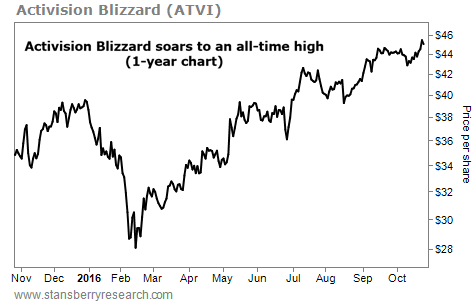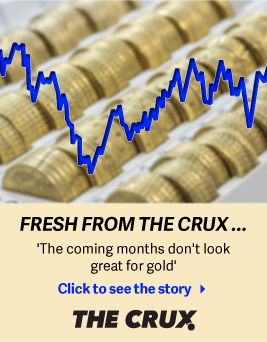| Home | About Us | Resources | Archive | Free Reports | Market Window |
There Is 100% Chance of a Recession Next YearBy
Thursday, October 27, 2016
Imagine what's going to happen when we go into a recession again...
As I explained yesterday, artificially low interest rates restrict growth, limit consumer spending, and encourage individuals and corporations to borrow far too much money.
We're seeing record debt at the corporate level, the government level, the consumer level (auto loans), and an entire generation (students) encumbered by massive debt.
Do you think those conditions are going to lead to calm, cool, and rational policy decisions? Do you think those conditions are going to be good for our banking system? Do you think that's going to make us less aggressive with our foreign policy? (It's Mexico's fault!) Do you think our political leaders are going to wake up and realize that it's their policies that have put us in this mess?
No way. They're going to keep "doubling down" until the whole thing blows up.
That's why I'm 100% certain we're going to enter another recession next year...
I've been writing about the warning signs for a long time – falling industrial production, declining trade, falling corporate profits, and rising corporate defaults. And I told you that employment would roll over next. It has. The latest jobs report showed that unemployment ticked up to 5%. The employment situation has been getting steadily weaker for the last year.
Next year is going to be ugly for stocks. But it will be even worse for corporate bonds...
In 2017, we'll see the first maturities on the huge amount of junk bonds that were issued during the record issuance cycle between 2010 and 2015.
Roughly $125 billion will be due. The default rate across the sector will approach 10%. And it will get worse and worse... In 2018, another $250 billion will come due. In 2019, another $350 billion. And that's before two years of $400 billion or more in junk matures in 2020 and 2021.
If we're in a recession next year... look out. All of these debts will be seen as unfinanceable. The bond prices of highly leveraged companies will collapse. As for stocks, the damage to share prices will be much worse.
The fact is, most of these loans should have never been made. These companies are vastly overleveraged. And their financial condition, as a group, hasn't improved since 2010... It has gotten worse. These companies simply can't generate enough income to pay back their loans. A reckoning is coming – and it's long overdue.
Unfortunately, small, junk-rated companies aren't the only ones who will have a big problem...
Historically, "investment grade" meant that a corporation was extremely unlikely to ever default, regardless of the economic circumstances. The investment-grade default rate is usually just above zero during a recession. The lowest-rated "tranche" of investment-grade debt (BBB) would typically see a few defaults. In the default cycle between 1998 and 2002, for example, a little more than 1% of these bonds defaulted.
But... BBB isn't what it used to be. A lot of BBB credit is just wishful thinking.
A good example of a weak BBB credit is Devon Energy (DVN). Devon is a highly levered oil and gas business that routinely operates with negative cash flows. (Last year's tally was negative $290 million.) Incredibly, despite the obvious risks to this individual balance sheet and the historic booms and busts of the domestic-energy industry, Devon's benchmark bonds are only paying 3.4%, and the company is rated BBB.
How can a company be considered "investment grade" if a one-level credit downgrade could leave it unable to access the capital markets? After all, in periods of credit stress, junk-bond issuance disappears. And selling assets won't repay these debts... The company is far too encumbered.
There are dozens and dozens of companies like Devon. Maybe hundreds.
As companies have added debt in this cycle, more and more of them have been downgraded to BBB. Where 10 years ago only 14% of investment-grade bonds were BBB-rated, more than 30% of the investment-grade market today is BBB-rated. In other words, "investment grade" just doesn't mean what it used to.
That's why even though annual default rates on investment-grade bonds have historically been low, we suspect that the coming default cycle is going to be much, much worse.
I expect we'll see annual default rates of at least 3% on BBB debt, with cumulative defaults reaching close to 15%. Keep in mind, almost $2 trillion worth of BBB-rated "investment grade" debt is outstanding. Losses like the kind I expect during the next cycle could result in more than $500 billion in total defaults. And that's just the defaults from the "investment grade" debt.
I've been warning about the coming credit cycle for about a year...
So far, I've been pretty much on the mark. Default rates keep creeping higher and higher. Economic conditions are getting weaker and weaker. What's coming in 2018 and 2019 will be the biggest economic storm of our lives. It's going to wipe out a lot of people – unemployment will go way over 10%. And more than $1 trillion worth of bonds will default. This is absolutely going to happen because the government can buy all the bonds it wants, but it can't make them pay.
This situation doesn't have to be a disaster for you, though. Don't think of it as a crisis. Think of it as a reckoning. The foolish and spendthrift are going to learn a lesson. And the wise and patient will reap their fair reward. That's why I call what's coming "the greatest legal transfer of wealth in history." It's going to be an incredible show.
Want a front-row seat?
Then please join us in my latest research project, Stansberry's Big Trade.
Our plan is to spend the next five years or so predicting corporate defaults. But that's not all. What we're going to do is a little different... and potentially a lot more valuable. We're looking for weak credit where there's still tremendous equity value and an undeserved rating.
We've done that work over the last month and put together our list. It's called "The Dirty Thirty." As a group, these stocks...
Our strategy will be to buy long-dated put options on these firms. Then we just have to wait for credit conditions to deteriorate, which we know they will. I believe it will be possible to make 10 times your initial capital on these trades as a whole. These companies are going to put a huge dent into the net worth of millions of Americans. Believe me, I'm aware of the dangers investors in these companies' stocks and bonds face... But I can't change it. I can only try to help you survive and prosper.
If you act now, while market conditions are in our favor, you can turn this situation from a tragedy into your greatest triumph.
Regards,
Porter Stansberry
Further Reading:
"Socialism doesn't work," Porter wrote yesterday. "And manipulating interest rates makes it a lot worse." See why he says the U.S. government is digging our financial grave here.
Market NotesTHIS CAPITAL-EFFICIENT BUSINESS IS SOARING Today's chart shows one of our favorite investment concepts at work: owning capital-efficient businesses.
Regular readers are familiar with the concept of capital efficiency. In short, these businesses are capable of greatly increasing their earnings without spending much additional capital. They have long-standing products, strong customer loyalty, can gradually raise prices when they need to, and consistently return loads of money to shareholders.
Today, we're highlighting a capital-efficient juggernaut that has skyrocketed in recent years: Activision Blizzard (ATVI).
Activision Blizzard is the world's largest interactive-gaming company. It publishes popular video-game franchises such as Guitar Hero, Call of Duty, World of Warcraft, and Diablo. And the company has been on a tear this year... As you can see below, shares are up nearly 45% since February and it just touched a new all-time high. It's more proof that investing in capital-efficient businesses is one of the safest ways to make money in the stock market.
 |
Recent Articles
|



